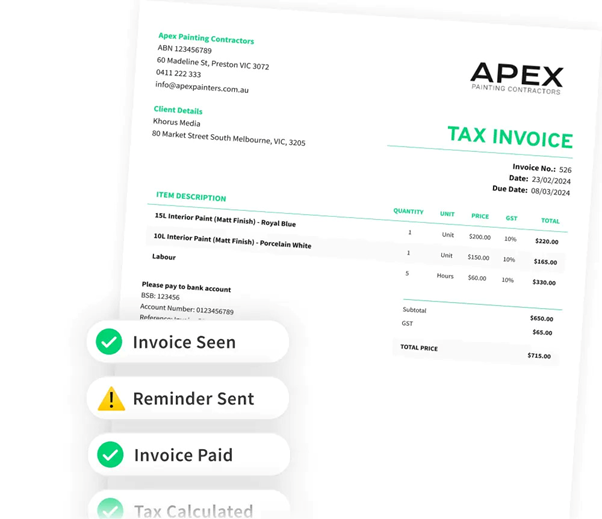Why cash flow matters more than profit (at least in the short term)
Let’s clear up a common misconception: Profit and cash flow are NOT the same thing. Profit is what’s left after you subtract your expenses from your revenue – it’s an accounting figure. Cash flow, on the other hand, is the actual movement of money in and out of your business bank accounts. Think of it this way: profit is like your report card, while cash flow is the money you have in your wallet to spend.
You can be profitable on paper but still struggle to pay your bills if your cash flow is poor. This can happen if you have a lot of outstanding invoices or if your money is tied up in inventory.
Imagine this: You’ve made a massive sale, and your profit margin looks great. But what if the client takes 90 days to pay? You still have bills to pay, employees to compensate, and inventory to restock. That’s where cash flow comes in. Without it, even the most profitable business can find itself in hot water.
The domino effect of poor cash flow
Poor cash flow management can trigger a series of unfortunate events:
- Missed opportunities: You might have to pass on a lucrative project because you lack the funds to cover the upfront costs.
- Stunted growth: Lack of cash can prevent you from investing in new equipment, hiring additional staff, or expanding your marketing efforts.
- Strained relationships: Late payments to suppliers or vendors can damage your reputation and make it harder to negotiate favourable terms in the future.
- Increased stress: Constantly worrying about making ends meet can take a toll on your mental and physical health.
- Business failure: In the worst-case scenario, severe cash flow problems can force you to close your doors.
Key principles for healthy cash flow
Now that we understand the importance of cash flow let’s explore some key principles to help you maintain a healthy financial flow:
1.Separate business and personal finances
This might seem basic, but you’d be surprised how many entrepreneurs mix their personal and business finances. Let’s break down why separation is essential:
- Crystal-clear accounting: With a dedicated business bank accounts, you’ll gain a much clearer picture of your income and expenses. No more sifting through personal transactions to find that business lunch receipt! This clarity makes bookkeeping, tax preparation, and financial analysis a breeze.
- Professionalism & credibility: Using a business credit card and bank account presents a more professional image to clients and vendors. It demonstrates that you’re serious about your business and committed to responsible financial management.
- Legal protection: In some cases, keeping business and personal finances separate can offer a layer of legal protection for your assets. Your personal assets might be shielded if your business faces financial difficulties or legal action.
Pro-tip: Consider opening a business savings account to set aside funds for taxes, future investments, or unexpected expenses. This adds another layer of financial security. Plus, business interest savings accounts allow you to earn more.
- Implement Profit First accounts
The Profit First system, popularised by Mike Michalowicz, revolutionises how you think about profit. It’s simple but incredibly effective:
- Pay yourself first: Instead of waiting to see what’s left over after expenses, allocate a percentage of every income directly to a “Profit” account. This ensures you’re consistently rewarding yourself for your hard work and building a financial safety net.
- Allocate to other buckets: The remaining funds are then distributed into separate accounts for operating expenses, taxes, and owner’s pay. This system forces you to live within your means and prevents overspending. Read how allocation works here.
- Build a financial cushion: Over time, the Profit account grows, providing a buffer for lean times, investment opportunities, or even that dream vacation you’ve been eyeing.
Pro-tip: Start small with your Profit allocation and gradually increase it as your business grows. Even a small percentage can make a significant difference over time.
- Send quotes and invoices ASAP

Timely billing is essential for maintaining a healthy cash flow.
- Set clear expectations: Provide a detailed quote upfront, outlining the scope of work, pricing, payment terms, and any potential late fees. This helps avoid misunderstandings and disputes down the line.
- Invoice promptly: Don’t wait until the end of the month or project completion to send invoices. The sooner you invoice, the sooner you’ll get paid. Consider using a tool like Thriday to automate reminders and keep your invoicing on autopilot.
- Set shorter payment terms: You get to set your payment terms. Don’t allow for 30+ days, consider 7-14 days instead.
- Be professional and polite: Use clear, concise language in your invoices and maintain a professional tone. This reflects well on your business and encourages timely payment.
Pro-tip: Consider offering a small discount for early payment to incentivise clients to pay you sooner.
4. Utilise smart invoice features
Modern invoicing software offers a range of features that can streamline your billing process and improve your cash flow:
- Online payments: Make it easy for clients to pay you by accepting online payments through credit cards, debit cards, or electronic bank transfers.
- Automated reminders: Set up automatic payment reminders to gently nudge clients who might have forgotten to pay.
- Late fees: Implement a clear late fee policy to discourage late payments and compensate you for the inconvenience.
- Recurring invoices: Automate recurring invoices for subscription-based services or ongoing projects.
Pro-tip: Explore different invoicing software options and choose one that fits your business needs and budget. Consider using a comprehensive business finance management app like Thriday, available in Australia, to further streamline your invoicing and overall financial management.
Cash flow management is an ongoing journey.
Remember, cash flow management is not a one-time fix; it’s an ongoing process. You need to monitor your finances regularly, adjust your strategies as needed, and stay proactive. The rewards of effective cash flow management are immense. You’ll enjoy greater peace of mind, increased financial stability, and the freedom to pursue growth opportunities.





